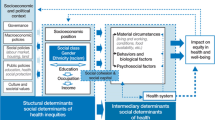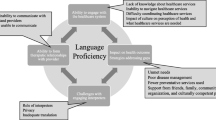Abstract
The recent crisis in the Middle East has prompted the exodus of millions of refugees from the region who are at present seeking shelter across Europe and in the United States. Among the most immediate needs of refugees upon arrival in a host country is health care, and it is one of the most sustained interactions they experience. Home visits are a common form of primary care for refugees. The authors review the literature to identify themes related to challenges and strategies for providing home based primary care to refugees. The literature review was performed by searching cross-disciplinary databases utilizing Onesearch, but focusing primarily on results produced through CINAHL, EBSCOHOST, and Pub Med databases. To maximize the number of studies included, there was no time frame placed upon publication dates of articles within the search. A total of 55 articles were included in this paper.
Similar content being viewed by others
References
Muecke MA. Caring for Southeast Asian refugee patients in the USA. Am J Public Health. 1983;73(4):431–8.
Burchill J. Safeguarding vulnerable families: work with refugees and asylum seekers. Community Practit. 2011;84(2):23.
Burchill J, Pevalin DJ. Demonstrating cultural competence within health-visiting practice: working with refugee and asylum-seeking families. Divers Equal Health Care. 2014;11(2):151–9.
Crosby SS. Primary care management of non English-speaking refugees who have experienced trauma: a clinical review. JAMA. 2013;310(5):519–28.
Drennan VM, Joseph J. Health visiting and refugee families: issues in professional practice. J Adv Nurs. 2005;49(2):155–63.
McCulley A. The Physical and Psychological Sequelae in Adult Refugees Or Asylum Seekers Who Have Survived Torture (Master's Thesis). 2013. Retrieved from https://ethnomed.org/clinical/torture/torture-literature-review/AshleyMcCulley_Dec2013_final.pdf.
Gross CS. Struggling with imaginaries of trauma and trust: the refugee experience in Switzerland. Cult Med Psychiatry. 2004;28(2):151–67.
Mirghani Z. Healing through sharing: an outreach project with Iraqi refugee volunteers in Syria. Intervention. 2013;11(3):321–9.
Nies MA, Lim WYA, Fanning K, et al. Importance of interprofessional healthcare for vulnerable refugee populations. J Immigr Minor Health. 2016;18(5):941–3.
Green H, Sperlinger D, Carswell K. Too close to home? Experiences of Kurdish refugee interpreters working in UK mental health services. J Ment Health. 2012;21(3):227–35.
Procter NG. Emergency mental health nursing for self-harming refugees and asylum seekers. Int J Ment Health Nurs. 2005;14(3):196–201.
Cc Rousseau, Measham T, Moro MA. Working with interpreters in child mental health. Child Adolesc Ment Health. 2011;16(1):55–9.
Stapleton H, Murphy R, Kildea S. Lost in translation: staff and interpreters, Äô experiences of the Edinburgh Postnatal Depression Scale with women from refugee backgrounds. Issues Ment Health Nurs. 2013;34(9):648–57.
Suurmond J, Seeleman C, Rupp I, et al. Cultural competence among nurse practitioners working with asylum seekers. Nurse Educ Today. 2010;30(8):821–6.
Tesfaye HT, DiP M. Health visitors’ perceptions of barriers to health and wellbeing. Community Pract. 2015;880:22–5.
Barnes J, Ball M, Niven L. Providing the family-nurse partnership programme through interpreters in England. Health Soc Care Community. 2011;19(4):382–91.
Mirza M, Luna R, Mathews B, et al. Barriers to healthcare access among refugees with disabilities and chronic health conditions resettled in the US Midwest. J Immigr Minor Health. 2014;16(4):733–42.
Nelson-Peterman JL, Toof R, Liang SL, et al. Long-term refugee health health behaviors and outcomes of Cambodian refugee and immigrant women. Health Educ Behav. 2015; 1090198115590779.
Dmytryshyn AL, Jack SM, Ballantyne M, et al. Long-term home visiting with vulnerable young mothers: an interpretive description of the impact on public health nurses. BMC Nurs. 2015;14(1):1.
Edes T, Kinosian B, Vuckovic NH, et al. Better access, quality, and cost for clinically complex veterans with home-based primary care. J Am Geriatr Soc. 2014;62(10):1954–61.
Stall N, Nowaczynski M, Sinha SK. Systematic review of outcomes from home-based primary care programs for homebound older adults. J Am Geriatr Soc. 2014;62(12):2243–51.
Hill L, Gray R, Stroud J, et al. Interprofessional learning to prepare medical and social work students for practice with refugees and asylum seekers. Soc Work Educ. 2009;28(3):298–308.
Mollica RF. Medical best practices for the treatment of torture survivors. Torture. 2011;21(1):8–17.
Pace M, Al-Obaydi S, Nourian MM, et al. Health services for refugees in the United States: policies and recommendations. Health 2015;5(8):63–8.
Reid Ponte P, Conlin G, Conway J, et al. Making patient-centered care come alive. J Nurs Adm. 2003;33(2):82–90.
Singer J, Adams J. The place of complementary therapies in an integrated model of refugee health care: counsellors’ and refugee clients’ perspectives. J Refugee Stud. 2011. doi:10.1093/jrs/fer001.
Smith-Carrier T, Neysmith S. Analyzing the interprofessional working of a home-based primary care team. Canadian Journal on Aging/La Revue canadienne du vieillissement. 2014;33(03):271–84.
Dubus N. Creating a bridge to healing: a professional/paraprofessional team approach. J Soc Work Pract. 2009;23(3):327–36.
Hall P. Interprofessional teamwork: professional cultures as barriers. J Interprof Care. 2005;19(sup1):188–96.
Martin DM. Interprofessional teams in the patient-centered medical home. Nurs Adm Quart. 2014;38(3):214–20.
Mirdal GM, Ryding E, Essendrop Sondej M. Traumatized refugees, their therapists, and their interpreters: Three perspectives on psychological treatment. Psychol Psychother: Theory Res Pract. 2012;85(4):436–55.
Masmas T, Miller E, Buhmann C, et al. Health status and degree of traumatisation among newly arrived asylum seeker—secondary publication. Ugeskr Laeger. 2010;172(2):120–4.
White CC, Solid CA, Hodges JS, et al. Does Integrated care affect healthcare utilization in multi-problem refugees? J Immigr Minor Health. 2015;17(5):1444–50.
Lester H, Mead N, Graham CC, et al. An exploration of the value and mechanisms of befriending for older adults in England. Age Soc. 2012;32(02):307–28.
Douglas N. Befriending breastfeeding: a home-based antenatal pilot for South Asian families. Community Pract. 2012;85(6):28–31.
Mccarthy R, Haith-Cooper M. Evaluating the impact of befriending for pregnant asylum-seeking and refugee women. Br J Midwifery 2013;21(6):404–9.
Mitchell G, Pistrang N. Befriending for mental health problems: processes of helping. Psychol Psychother: Theory Res Pract. 2011;84(2):151–69.
Grodin MA, Piwowarczyk L, Fulker D, et al. Treating survivors of torture and refugee trauma: a preliminary case series using qigong and t’ai chi. J Altern Complement Med. 2008;14(7):801–6.
Bodeker G, Neumann C, Lall P, et al. Traditional medicine use and healthworker training in a refugee setting at the Thai, ÄìBurma border. J Refugee Stud. 2005;18(1):76–99.
Chung RCY, Singer MK. Interpretation of symptom presentation and distress a Southeast Asian refugee example. J Nerv Ment Disease. 1995;183(10):639–48.
Hiegel JP. Use of indigenous concepts and healers in the care of refugees: some experiences from the Thai border camps. In: Marcella AJ, et al., editors. Amidst peril and pain: the mental health and wellbeing of the world’s refugees. Washington, DC: American Psychological Association; 1994. p. 293–309.
Hollifield M, Warner TD, Lian N, et al. Measuring trauma and health status in refugees: a critical review. JAMA. 2002;288(5):611–21.
Jenkins JH. Culture, emotion and PTSD. In: Marsella MFA, Gerrity E, Scurfield R, editors. Ethnocultural aspects of PTSD: issues, research, and clinical applications. Washington, DC: American Psychological Association; 1994. p. 165–82.
Julian R. Migrant and refugee health. In: Grbich C, editor. Health in Australia: sociologocial concepts and issues. Pearson Longman; 2004. p. 101–27.
Kneebone SA. Refugee health, humanitarianism, and human rights. In: Allotey P, editor. The health of refugees: public health perspectives from crisis to settlement. Melbourne: Oxford University Press; 2003. p. 1–13.
Silove D. The psychosocial effects of torture, mass human rights violations, and refugee trauma: toward an integrated conceptual framework. J Nerv Ment Dis. 1999;187(4):200–7.
Tribe R. Health pluralism: A more appropriate alternative to Western models of therapy in the context of the civil conflict and natural disaster in Sri Lanka? J Refugee Stud. 2007;20(1):21–36.
Watters C. Emerging paradigms in the mental health care of refugees. Soc Sci Med. 2001;52(11):1709–18.
Westermeyer J, Janca A. Language, culture and psychopathology: conceptual and methodological issues. Transcult Psychiatry. 1997;34(3):291–311.
Beeber LS, Lewis VS, Cooper C, et al. Meeting the now need: PMH-APRN—interpreter teams provide in-home mental health intervention for depressed Latina mothers with limited English proficiency. J Am Psychiatr Nurses Assoc. 2009;15(4):249–59.
Brooks K, Stifani B, Batlle H, et al. Patient perspectives on the need for and barriers to professional medical interpretation. R I Med J. 2013;99(1):30–3.
Cunningham H, Cecilia Akuete-Penn M, Meyer DD. Satisfaction with telephonic interpreters in pediatric care. J Natl Med Assoc. 2008;100(4):429.
Miller KE. Beyond the frontstage: trust, access, and the relational context in research with refugee communities. Am J Community Psychol. 2004;33(3–4):217–27.
Powell C, Pagliara-Miller C. The use of volunteer interpreters during the 2010 Haiti earthquake: lessons learned from the USNS COMFORT Operation Unified Response Haiti. Am J Disaster Med. 2011;7(1):37–47.
Owen CL, English M. Working together as culture brokers by building trusting alliances with bilingual and bicultural newcomer paraprofessionals. Child Welf. 2005;84(5):669.
Acknowledgments
Health Resources and Services Administration (HRSA) Grant No. 1 UD7HP28528-01-00.
Author information
Authors and Affiliations
Corresponding author
Ethics declarations
Conflict of interest
The authors declare that they have no conflict of interest.
Human Subjects and Animal Welfare
This article does not contain any studies with human participants or animals performed by any of the authors.
Rights and permissions
About this article
Cite this article
Febles, C., Nies, M.A., Fanning, K. et al. Challenges and Strategies in Providing Home Based Primary Care for Refugees in the US. J Immigrant Minority Health 19, 1498–1505 (2017). https://doi.org/10.1007/s10903-016-0481-4
Published:
Issue Date:
DOI: https://doi.org/10.1007/s10903-016-0481-4




